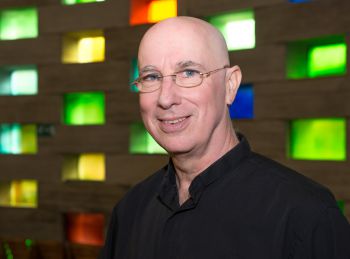Your wellbeing: Do no harm – but maybe just a bit of well-intended hurt
By: Sean Armstrong
Last updated: Thursday, 7 January 2021

Revd Chris McDermott, Lead Chaplain for the University of Sussex
Over the next months of this new year, I have decided to be a bit more systematic in these monthly articles for the newsletter. Rather than arbitrary and random themes I decided that each month I will address a different precept.
In the Buddhist tradition there are ten major precepts that people formally receive when they officially join a Sangha – a Buddhist community. I do not intend to present these precepts in any way that suggests an invitation to become a Buddhist but rather as principles that might usefully be embraced by anyone. At times they will resonate with the ‘commandments’ in the Judaic Christian tradition or even bits of perennial wisdom that may be taken on board by someone who is not particularly religious. In any case, I suggest that that they are less commandments from on high and more like descriptions of what our humanity looks like at its best.
The first precept can be expressed positively as ‘affirm life’ but is often stated in negative terms of ‘do no harm’. It suggests an orientation to living that is life affirming – my life, the life of others, and the wellbeing of communities and the planet. ‘Do no harm’ invites me to examine the impact of my words and actions on my own and other’s wellbeing. To deliberately undermine another person, to do damage to their reputation without just cause, to intentionally offer injury out of pique or malice and nurture hatred and resentment toward them is to harm them – and ourselves. Experience will tell us that we are not at our best in those situations.
But to ‘hurt’ – if I can make a distinction – is different from doing harm.
The reality is that people sometimes behave in appalling ways that do damage to themselves, other people and communities. (Think of the habit of contemptuous speak from POTUS 45 and the consequence of shameful scenes recently unfolding on Washington’s streets – not to mention the death of at least four individuals.) At such times we rightly feel anger and respond not with milquetoast protests but with actions and words that may hurt for the sake of pursuing justice, healing and restoration.
I try to be responsible and measured in my social media postings but at times I have sought to speak in a manner that is free of malice but nonetheless pointed in its empirical observations about events or behaviours in the public arena. By occasionally eliciting anger (even among some family members, I must say) and abuse – never mind hosting virtual brawls among people commenting. A friend refers to the occasional ‘bloodbaths’ on my Facebook page.
On the odd occasion someone has even responded positively by removing a fake item from their own media when I have noted the factual errors it contained. When I do venture out on occasion I do it without name calling or diminishing someone who disagrees with me. After all, except in the most egregious situation entailing the abuse of other human beings, I always allow space for that little voice in the back of the head saying, ‘but I could be wrong’.
On one occasion in the pre-social media past I had been involved in a very unpleasant work situation and was minded to walk away rather than face the individual concerned. I was told by a friend, who is a Franciscan Friar, that in his estimation I was behaving in a cowardly fashion. That was hurtful to hear – but he was right. He saved me from real harm as I faced the situation, addressed it head on and was much the better for it.
We do well to orient our lives around the precept ‘do no harm’ but occasionally will find that doing a little well intended hurt may be required in the bigger picture of affirming life.
